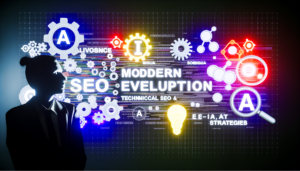The Role of Artificial Intelligence in Modern SEO Strategies
Search Engine Optimization (SEO) has evolved dramatically over the past decade, with artificial intelligence (AI) emerging as a transformative force. Today, AI-powered tools and algorithms are reshaping how marketers analyze data, optimize content, and predict search trends. From automating keyword research to enhancing user experience, AI is no longer a futuristic concept—it’s a core component of successful SEO strategies. This article explores how AI is redefining traditional SEO practices, the challenges it presents, and the opportunities it unlocks for businesses aiming to dominate search rankings. By understanding AI’s capabilities and limitations, marketers can leverage this technology to stay ahead in an increasingly competitive digital landscape.
AI-Driven Keyword Research and Semantic Analysis
Gone are the days of manually sifting through keyword lists. AI tools like natural language processing (NLP) now enable marketers to identify not just high-volume keywords but also semantically related phrases and user intent. Platforms such as Google’s BERT algorithm prioritize context over exact-match keywords, requiring SEO strategies to focus on topic clusters rather than isolated terms. AI-powered tools like Clearscope or SurferSEO analyze top-ranking content to suggest semantically relevant terms, ensuring content aligns with search engine expectations. This shift emphasizes comprehensive coverage of topics, improving content depth and relevance while reducing reliance on repetitive keyword stuffing.
Content Generation and Optimization at Scale
AI is revolutionizing content creation through tools like GPT-4 and Jasper, which generate human-like text based on user prompts. While these tools aren’t replacements for human creativity, they streamline the production of meta descriptions, blog outlines, and product descriptions. More importantly, AI excels at optimizing existing content. For example:
- Readability enhancements: Tools like Grammarly and Frase use AI to improve sentence structure and clarity.
- A/B testing: AI algorithms predict which headlines or CTAs will perform best, reducing guesswork.
- Personalization: Dynamic content tailored to user behavior, powered by machine learning, boosts engagement.
However, over-automation risks generic content—balancing AI efficiency with human oversight remains critical.
Technical SEO and Predictive Analytics
AI simplifies complex technical SEO tasks by automating audits, crawl budget optimization, and error detection. Tools like Screaming Frog integrate machine learning to prioritize fixes based on potential ranking impact. Predictive analytics take this further, forecasting trends like seasonal search volume shifts or algorithm updates. For instance, BrightEdge’s Data Cube uses AI to simulate how changes in content or site structure might affect rankings. This proactive approach helps businesses allocate resources efficiently, addressing issues before they harm visibility. Yet, reliance on AI requires constant validation, as algorithms may misinterpret niche industry nuances without human input.
User Experience and Behavioral Signals
Search engines increasingly prioritize user experience (UX) metrics like dwell time and bounce rate. AI enhances UX by analyzing behavioral data to identify friction points. Heatmap tools such as Hotjar use machine learning to visualize user interactions, while chatbots driven by NLP improve onsite navigation. Additionally, AI-driven voice search optimization—tailoring content for conversational queries—is critical as voice-activated devices proliferate. By aligning SEO with UX, businesses create seamless journeys that satisfy both users and search engines. However, ethical concerns around data privacy and AI bias require careful navigation to maintain trust.
Conclusion
Artificial intelligence is undeniably reshaping SEO, offering unprecedented efficiency in keyword research, content optimization, technical audits, and user experience enhancements. By automating repetitive tasks and uncovering data-driven insights, AI empowers marketers to focus on strategy and creativity. However, its limitations—such as potential biases and the risk of overly generic outputs—demand a balanced approach. Human expertise remains vital to interpret AI findings, inject brand voice, and ensure ethical practices. As search algorithms grow smarter, integrating AI into SEO strategies isn’t just optional; it’s essential for staying competitive. Embracing this technology while maintaining a user-centric focus will define the future of search success.


